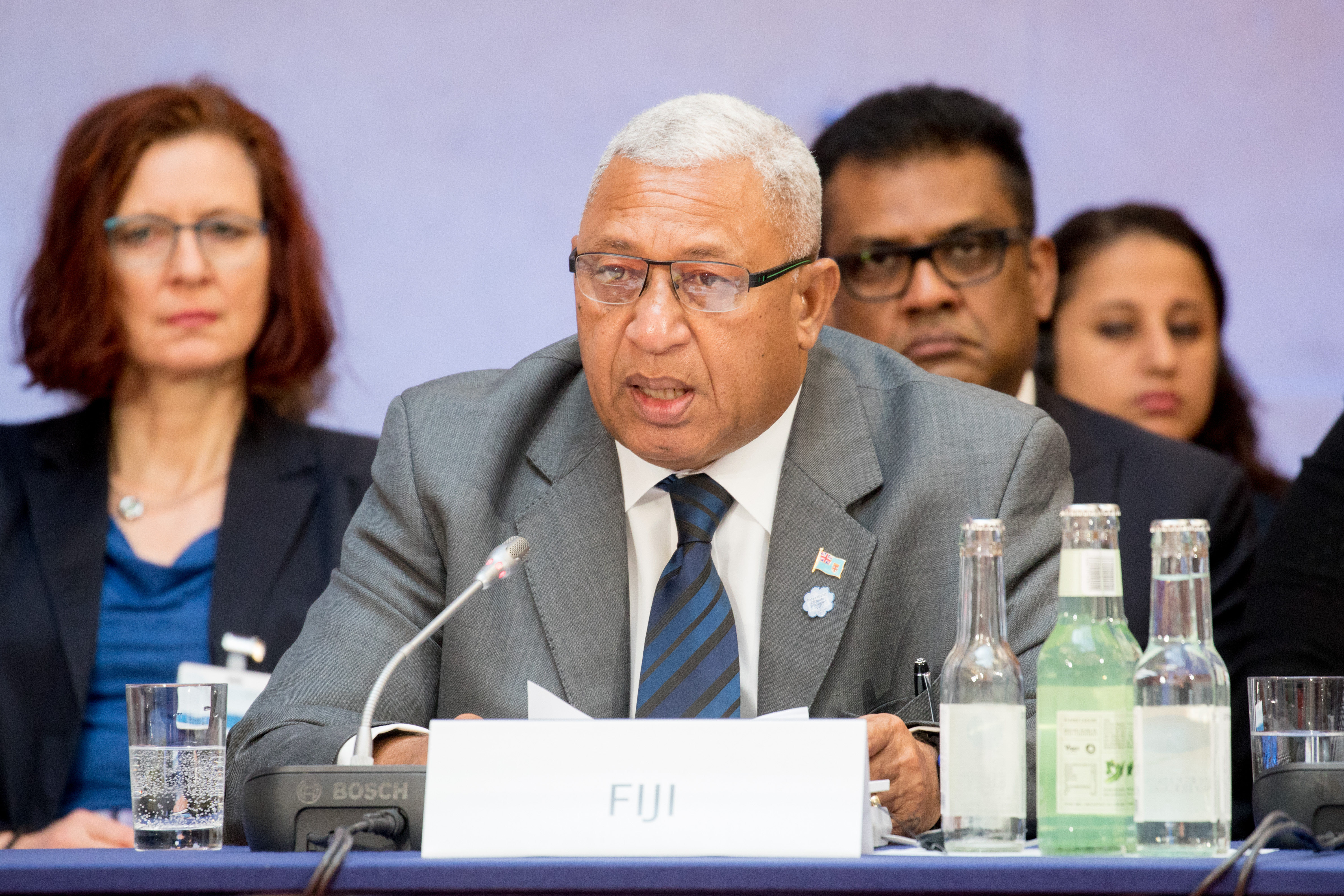

(Photo: Kay Nietfeld/AFP/Getty Images)
In July, leaders from the Pacific Small Island Developing States gathered at the Grand Pacific Hotel in Suva, Fiji, where Frank Bainimarama, Fiji’s prime minister and the incoming president of this year’s COP23, delivered a warning.
“The scientists are now telling us that, with the disappearance of the summer ice around the North Pole, and the eventual melting of the Arctic and Greenland, the global average sea rise would be a terrifying seven meters,” Bainimarama said. “Which means this room would be flooded to the ceiling. Much of Suva, as we know it, would be under water, and so would large parts of every coastal city in the world.”
The leaders were gathered for the first Climate Action Pacific Partnership event, where the nations most vulnerable to climate change met to determine how to ensure strong climate action from the countries most responsible for it. “The scientific understanding, and our daily experience, is that climate change is happening at a faster rate than was appreciated at the time of the Paris Agreement,” the group’s leaders wrote in a statement. “We therefore believe that it is imperative for the world to focus on the more ambitious target in the Paris Agreement of limiting warming to 1.5 degrees Celsius.”
Parties to the Paris Agreement pledged to limit global warming to two degrees Celsius, but even if all the parties were on track to live up to the pledges that they made in their Nationally Determined Contributions—and, for the record, most are not—global temperatures would still rise by nearly three degrees Celsius by 2100. Under such a scenario, entire Pacific island nations could disappear.
All across the Pacific, sea levels are rising faster than almost anywhere else. In the Solomon Islands—where at least five reef islands have already been inundated—the sea has risen as much as 10 millimeters a year since 1993, far outpacing the global average of three millimeters per year. The 33 coral atolls and reef islands that make up the nation of Kiribati could all be underwater by 2100. Salt water will almost certainly intrude on the country’s fresh water supplies and poison its agricultural soils long before that, making the islands uninhabitable even before the end of the century. To prepare for a future migration, the government of Kiribati has bought approximately 6,000 acres in Fiji, which seems to be faring a little better than its neighbors.
“Even if the battle to keep your islands above the water is lost, we will continue to stand shoulder-to-shoulder with you,” Bainimarama said in July, reaffirming Fiji’s promise to take in refugees from Kiribati and Tuvalu.
Still, even though its average elevation is higher than that of its neighbors, much of Fiji is under threat.
The ocean around Fiji has risen at an average rate of six millimeters a year since 1993, according to the country’s National Climate Change Policy. And the rate is only increasing, as more ice melts and seawater continues to expand as it warms. Unless drastic action is taken to cut global greenhouse-gas emissions and stop temperature from climbing two or more degrees by the end of the century, conservative estimates show sea levels rising by another 0.82 meters, or nearly three feet.
In 2012, Vunidogoloa, a coastal village on Fiji’s second largest island, Vanua Levu, became the first Fijian village that had to be resettled thanks to climate change. High tides had combined with heavy rains to flood the village regularly, and, as a result, nothing would grow in the community’s salty soil. The government has since identified over 40 other coastal villages that will soon need to be relocated, and is finalizing what will become the world’s first national relocation guidelines.
Fiji will be the first Pacific island to preside over the United Nations’ international climate, summit, though, for logistical reasons, the conference itself will take place in Bonn, Germany. Germany also happens to hold the presidency of the G20 this year—the group comprising the world’s wealthiest nations—and Bainimarama delivered a strongly worded message to those member countries in July. “To the leaders of the G20,” he said at the hotel in Suva, “we have not caused this crisis; your nations have.”





